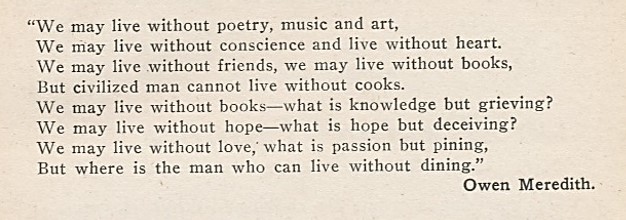
This poem in a hundred-year-old church cookbook doesn’t quite work for me. I need poetry, music, and art – and friends, hope, love, and books. And, what about women? Don’t they need to dine, too? Nonetheless, the introductory pages in old church cookbooks provide an intriguing window into the times.

This fellow doesn’t seem to want much. Just a little woman to cook and clean for him 😉
What more could you ask? 🙂
Oh my, the olden ways in olden days sure makes me chuckle sometimes…
Me, too. Sometimes people said things in the oddest ways back then.
The word “woman” was never used very often, even in the early Star Trek intro. They were trying hard to encompass all, but they still went “where no man has gone before.” We are getting there. It only took until 1983 to get a woman in space. (saying this sarcastically) But, strides are being made.
Good point – “Man” was often used back then to refer to all people. This makes me think about how the word “mankind” could be used instead of “people” in the previous sentence. Is mankind still used these days? . . . maybe it’s humankind.
I only ever hear people use terms like humankind. Mankind seems to have fallen out of fashion completely, at least in the area where I live!
He sounds like a very bitter fellow… 🙂
I agree. . . I like how you described him.
While it is true that one could live with out ,music,art,love,and books. A person without hope ,their life will be rather short but a little longer then the person without food. I’m mighty glad I have them all ,and I’m not the only cook in this house. I’m Blessed.
I’m blessed, too.
This fellow would live an odd life …
Back when I was in school, I remember learning about Maslow’s hierarchy of needs. The general idea was that your physiological needs (food, shelter) must be met before you could even think about other things. This person seems very focused on one of the basic needs.
Hi Sheryl. Maslow’s hierarchy seems to drive a lot of our behaviour.
What a harsh view of life! A very medieval idea that too much knowledge will only hurt you by making you aware of possibilities and worlds that are beyond you. As for love, as the song goes, “It’s the heart afraid of breaking/ That never learns to dance.”
I agree. The lines from the song perfectly describe the attitude of the poem’s author. Thank you for reminding me of it. The person who wrote this poem seems like someone how has been hurt a lot in life, and has built a wall between himself and his emotions – though he’s obviously trying to show that he appreciates and cares about the cook.
Wow! I would not put dining at the top of what I cannot live without. But a good quote for a cookbook.
Finding Eliza
I’m glad you enjoyed the quote. At a very basic level, I can’t live without food; but dining I could. 🙂
I’m not as inclined as others to judge previous times by our standards. And I don’t see the poem as harsh, or odd, or the writer as bitter or medieval. Irony doesn’t always translate well, whether from the past or in the future.
You’re absolutely right. The way we phrase things and describe them have definitely changed across the years. I’ve also noticed that humor often doesn’t translate well across the years. Old magazines often contained a joke page. When I read the jokes, they seldom seen funny – and sometimes seem offensive.
Times and words have changed. Life has changed. We see the changing world in a different set of circumstances and we have a fuller set of changed information and meanings. You’ve got it.
Sincerely, Sheila
How true – the lens through which we see the world has evolved.
We need to eat in order to survive. But we (male and female!) need the arts, friends, books, hope and love in order to thrive! Dining may be a fine art and cooking can be very creative but it’s not enough to satisfy the human spirit.
I agree!
I agree! Life without love, books, art, etc. would just be existing, not actually living.
I like how you framed it. Existing is very different from living.
Hopefully this clever little poem is tongue in cheek because, as everyone else is saying, he’s giving up all the good stuff!
I think that you’re right, and that the author didn’t intend for his words to be taken literally.
Happy Easter wishes sweetie. Hugz Lisa and Bear
Happy Easter!